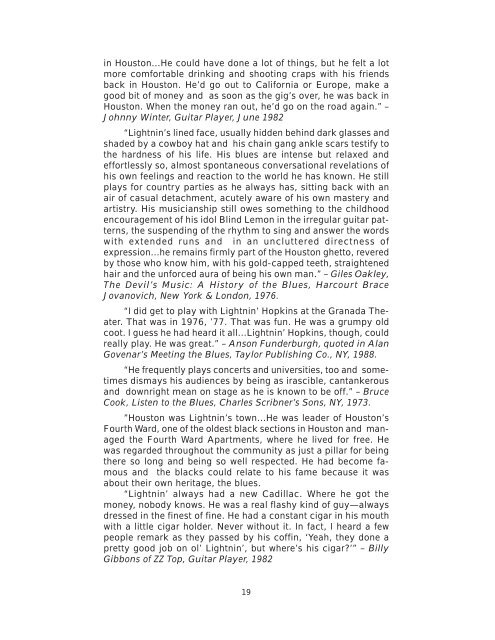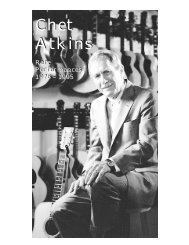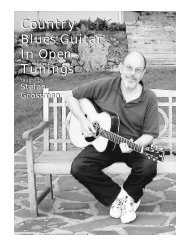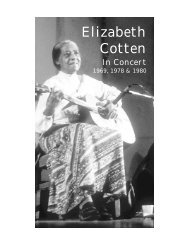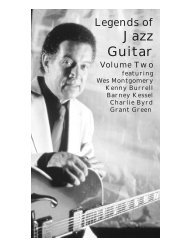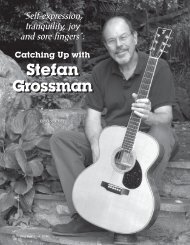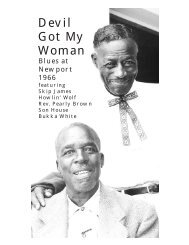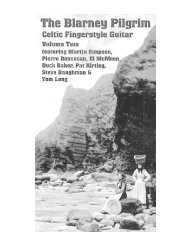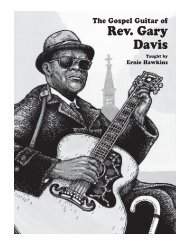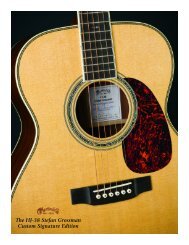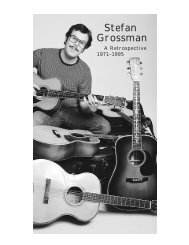Lightnin' Hopkins - Stefan Grossman's Guitar Workshop
Lightnin' Hopkins - Stefan Grossman's Guitar Workshop
Lightnin' Hopkins - Stefan Grossman's Guitar Workshop
Create successful ePaper yourself
Turn your PDF publications into a flip-book with our unique Google optimized e-Paper software.
in Houston...He could have done a lot of things, but he felt a lot<br />
more comfortable drinking and shooting craps with his friends<br />
back in Houston. He’d go out to California or Europe, make a<br />
good bit of money and as soon as the gig’s over, he was back in<br />
Houston. When the money ran out, he’d go on the road again.” –<br />
Johnny Winter, <strong>Guitar</strong> Player, June 1982<br />
“Lightnin’s lined face, usually hidden behind dark glasses and<br />
shaded by a cowboy hat and his chain gang ankle scars testify to<br />
the hardness of his life. His blues are intense but relaxed and<br />
effortlessly so, almost spontaneous conversational revelations of<br />
his own feelings and reaction to the world he has known. He still<br />
plays for country parties as he always has, sitting back with an<br />
air of casual detachment, acutely aware of his own mastery and<br />
artistry. His musicianship still owes something to the childhood<br />
encouragement of his idol Blind Lemon in the irregular guitar patterns,<br />
the suspending of the rhythm to sing and answer the words<br />
with extended runs and in an uncluttered directness of<br />
expression...he remains firmly part of the Houston ghetto, revered<br />
by those who know him, with his gold-capped teeth, straightened<br />
hair and the unforced aura of being his own man.” – Giles Oakley,<br />
The Devil’s Music: A History of the Blues, Harcourt Brace<br />
Jovanovich, New York & London, 1976.<br />
“I did get to play with Lightnin’ <strong>Hopkins</strong> at the Granada Theater.<br />
That was in 1976, ’77. That was fun. He was a grumpy old<br />
coot. I guess he had heard it all...Lightnin’ <strong>Hopkins</strong>, though, could<br />
really play. He was great.” – Anson Funderburgh, quoted in Alan<br />
Govenar’s Meeting the Blues, Taylor Publishing Co., NY, 1988.<br />
“He frequently plays concerts and universities, too and sometimes<br />
dismays his audiences by being as irascible, cantankerous<br />
and downright mean on stage as he is known to be off.” – Bruce<br />
Cook, Listen to the Blues, Charles Scribner’s Sons, NY, 1973.<br />
”Houston was Lightnin’s town...He was leader of Houston’s<br />
Fourth Ward, one of the oldest black sections in Houston and managed<br />
the Fourth Ward Apartments, where he lived for free. He<br />
was regarded throughout the community as just a pillar for being<br />
there so long and being so well respected. He had become famous<br />
and the blacks could relate to his fame because it was<br />
about their own heritage, the blues.<br />
“Lightnin’ always had a new Cadillac. Where he got the<br />
money, nobody knows. He was a real flashy kind of guy—always<br />
dressed in the finest of fine. He had a constant cigar in his mouth<br />
with a little cigar holder. Never without it. In fact, I heard a few<br />
people remark as they passed by his coffin, ‘Yeah, they done a<br />
pretty good job on ol’ Lightnin’, but where’s his cigar?’” – Billy<br />
Gibbons of ZZ Top, <strong>Guitar</strong> Player, 1982<br />
19


